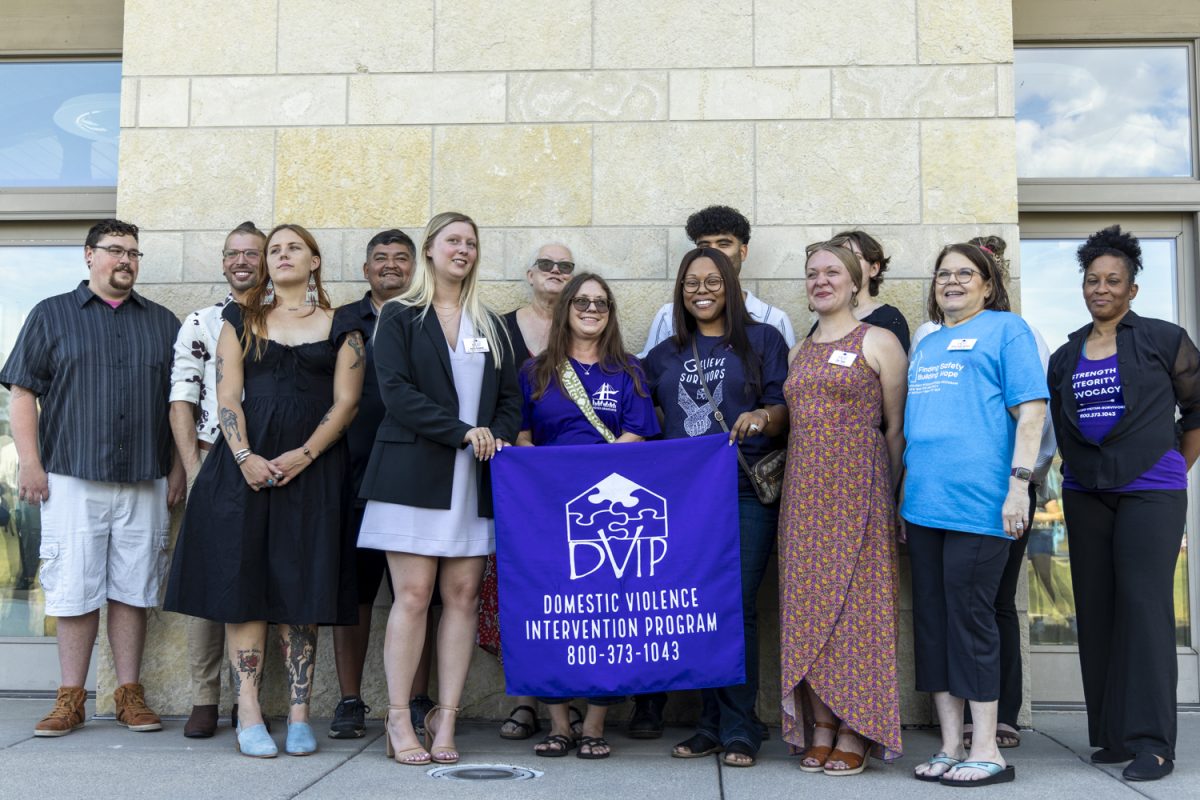To celebrate 45 years of serving southeast Iowa, the Domestic Violence Intervention Program, or DVIP, held an anniversary and ribbon-cutting celebration for its new emergency shelter Thursday.
DVIP offers prevention, advocacy, and supportive services to survivors of domestic violence, dating violence, human trafficking, and stalking.
The organization serves eight counties, including Cedar, Des Moines, Henry, Iowa, Johnson, Lee, Van Buren, and Washington. According to DVIP’s website, the nonprofit began as a grassroots effort from women in the University of Iowa in the ‘70s and ‘80s to create the organization that now serves thousands of survivors every year.
DVIP kicked off the evening’s festivities at the North Ridge Pavilion — 2250 Holiday Rd. in Coralville — with a ribbon-cutting ceremony for its new Terry Fortmann Emergency Shelter. The location of the shelter was not shared publicly to protect those who utilize its services.
Around three dozen of DVIP’s partners and community members were in attendance for the ceremony.
Inside the event venue, there were photo collages that showcased the nonprofit’s history, as well as table cards that shared data from DVIP’s various services. One card stated the organization and the Rape Victim Advocacy Program, a UI organization that assists victims of sexual violence, helped nearly 2,500 individuals in the last year.
The new $7.3 million emergency shelter will have 70 beds for those in need of escaping their current living situation, Kristie Fortmann-Doser, the executive director of DVIP, said. The shelter will double DVIP’s current number of beds and will include kitchens, kennels for pets, and offices on-site for individuals to receive help from staff right away, she said.
The emergency shelter is currently receiving finishing touches and will be ready to serve the community sometime soon, Fortmann-Doser said.
“We’ll have a whole crew to start us out because we, of course, have a shelter, and we’re housing 35 women, men, and children a night now,” Fortmann-Doser said. “So, we’re ready to move them, and they’re ready to go.”
When the plans were first in the works around a decade ago, Fortmann-Doser said the idea of such an expansive shelter seemed crazy to some. In order to raise the necessary funds for the project, DVIP transitioned from relying solely on federal and state grants to a mix of those grants and community support, she said.
RELATED: The final days of UI’s Rape Victim Advocacy Program
Monique Holtkamp, owner of Tspoons Coffee and Treats and a Greater Iowa City ambassador, said at the ceremony the Iowa City community is grateful to have DVIP in the area. The new shelter will be a benefit to the entire area, she said.
“With the opening of their new shelter, they will be even more equipped to serve their mission,” Holtkamp said. “You have made an investment not only in your organization but in our community.”
Johnson County Sheriff Brad Kunkel, who was in attendance at the event, said the work of local law enforcement and DVIP go hand-in-hand to ensure victims and survivors are receiving the best care and help possible.
“We’re fortunate that Johnson County, Iowa, can support a large service provider like this and have that impact on the Southeast part of the state,” Kunkel said. “It’s very critical that we have them here, that we have this local resource, and that they are always here for victims and survivors.”
After the ribbon cutting, the organization held its anniversary celebration, which included locally sourced refreshments and a silent auction for 15 art pieces to fundraise for the organization, according to a release from DVIP.
In recent months, DVIP has seen changes to its scope of services. In April, the UI announced it would be closing the doors of its Rape Victim Advocacy Program, or RVAP, and transitioning that program’s services to DVIP.
This transition has been underway since the announcement, and DVIP will take on all of RVAP’s services on Oct. 1. UI officials have said the transition will allow RVAP to grow its services under the larger staff and reach of DVIP. The decision for the transition received criticism and concern from the community, with protests taking place shortly after the announcement in April.
Alta Medea told the DI that the new shelter will house both victims of domestic assault and sexual violence after the transition is complete.



